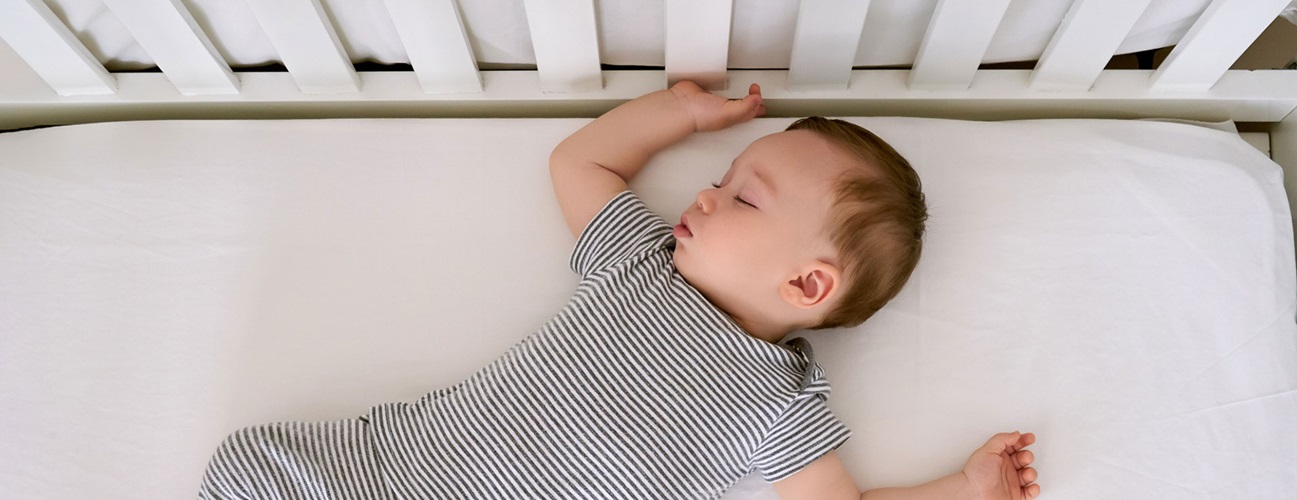New Parents: Tips for Quality Rest
As any new parent knows, frequent feedings, diaper changes and walking the halls with a fussy baby can make sleeping soundly at night nearly impossible. While taking care of yourself can be a challenge when you have a newborn, making sure you get enough shuteye needs to be a priority, says Johns Hopkins sleep specialist Grace W. Pien, M.D., M.S.C.E.
“If you’re getting enough sleep, you’re going to be better able to fulfill your new responsibilities of taking care of the baby,” she says. “You’ll be more patient and more likely to feel good about parenting.” Pien suggests the following strategies to catch some extra ZZZs.
Sleep While the Baby Sleeps
Newborns take frequent naps lasting anywhere from 2 to 4 hours, for a total of 16 to 18 hours of sleep each day. New parents are often severely sleep deprived if the only sleep they’re getting is overnight. “Sleeping while the baby sleeps can sometimes be challenging because of other kids in the house or our internal body clocks, but it’s a good idea to try and get some rest,” says Pien.
Skip Household Chores
Instead of vacuuming or loading the dishwasher, opt for sleep. “Friends and family are going to understand why the house is a mess,” says Pien. “Besides, they’re visiting to see your baby. Leave the dinner dishes in the sink for the next morning.”
Share Nighttime Baby Duties
You and your partner can share feedings, diaper changes and other nighttime baby duties. Moms who breastfeed can pump breast milk so their spouse can give a nighttime bottle to the baby, allowing mom to get some extra shuteye.
Place the Crib Near Your Bed
Placing the baby’s crib or bassinet next to your bed makes it easier to tend to the baby and then go back to sleep, making for a more restful night. While co-sleeping in the same bed with your little one may seem tempting, the American Academy of Pediatrics advises against it because of the risk of suffocating the baby.
Ask Friends and Family for Help
Don’t be shy asking for help from friends or relatives, whether it’s picking up groceries, sweeping the floor or holding the baby while you nap. Friends and family members may also be willing to help at night with diaper changes and feedings.
Take Advantage of Parental Leave
Employer policies on parental leave vary, but sometimes both parents can take time off from work, allowing them to more easily juggle baby care and leading to more sleep. For example, “Mom might take time off from work right after the baby is born, and her spouse can take leave several weeks later, helping mom to get some sleep as she transitions back to work,” says Pien.
Practice Good Sleep Hygiene
Good sleep hygiene can help you get more rest, whether or not you have a newborn at home. Strategies include:
- Avoiding caffeine: This stimulant can interfere with your sleep cycle.
- Not using electronics before bed: “You may want to post the latest pictures of your baby on social media, but using mobile phones, tablets and computers at night can interfere with total sleep time,” says Pien, adding that the light from electronic devices can confuse your body clock.
- Sticking to a regular sleep schedule: As difficult as this sounds as a new parent, try to turn in and wake up at the same time every day. “Just keep in mind that with a baby, you need to be flexible and expect nighttime awakenings.”
Help the Baby Sleep
Starting at 3 months of age, many babies start sleeping for longer stretches at night — anywhere from 4 to 6 hours — although this varies from infant to infant. By 6 months, two-thirds sleep through much of the night. Babies that are smaller at birth start to sleep for longer stretches when they are closer to 12 to 13 pounds.
To help little ones develop healthy sleep habits, she suggests putting babies down for the night when they’re drowsy. Although a personal choice, you may want to try to avoid rocking the baby to sleep in your arms before bedtime because this can become a habit. “Babies eventually need to learn how to fall asleep in their bed on their own,” she says.
She also advises helping babies learn how to self-soothe. This means not picking up your little one every time he or she fusses. Giving babies some time to comfort themselves so they can fall back asleep on their own can establish good sleeping habits, which in turn, helps parents get a good night’s rest.
Research Shows Children Who Fall Asleep on Their Own May Sleep Longer
Infants and toddlers who learn how to fall asleep on their own at night sleep for a longer duration, according to survey of more than 1,000 parents published in in the World Journal of Pediatrics. Researchers also found these children woke up fewer times at night than those who did not fall asleep on their own.
In addition, the study found that children of parents who worked full time were more likely to have a shorter nighttime sleep duration than those of parents who didn’t work full time.
The good news is older children had fewer problems with nighttime awakenings and slept for longer stretches. So if you’re a new parent who isn’t sleeping much, this will likely pass with time.






